The following "Best Of" list is part of a series among members of the Gameological community. For my piece, I chose to write about games I played for the first time in 2021, rather than focusing on games that were released in 2021. I chose to discuss fifteen categories out of the available eighteen. Keep your eyes peeled for other Gameological Awards posts!
Introduction
2021 was about making up for lost time. For most of last year, and a good amount of this year, we stayed indoors and longed for the company of friends and family. Then, the vaccines hit, and all of a sudden our social calendars were flooded. Every missed holiday, every forgotten birthday, every cancelled party…it was all crammed into the most hectic summer on record.
My gaming habits mirrored this mindset perfectly. As new titles were announced and franchises were revitalized, I realized I had to get caught up on the things I’d always said I’d “get around to playing.” I dug deep into a few core series, only sprinkling in a few standalone titles when I needed a change. I also got started on a Mario-themed project that required me to replay, uh, every 3D Mario game…but that’s a conversation for another time. Today we’re here to talk about the best games I played in 2021.
The nominees: Final Fantasy XII, Mortal Shell, Super Mario Odyssey, Super Mario Bros., Super Mario Bros., 2 Super Mario Bros., 3, Outer Wilds, Super Mario 3D World + Bowser’s Fury, Super Mario Galaxy, Halo 3, Final Fantasy XV, Super Mario Galaxy 2, SUPERHOT VR, Half-Life: Alyx, Ratchet & Clank, Metal Gear Solid 3: Snake Eater, Final Fantasy VII Remake, Metroid II: Return of Samus, Super Mario 64, Sonic the Hedgehog 2, Dr. Robotnik’s Mean Bean Machine, The Legend of Zelda: Skyward Sword, Halo 3: ODST, Metroid Fusion, Super Mario Sunshine, Demon’s Souls, Metroid: Samus Returns, Super Mario Galaxy (again, as Luigi), Metroid Dread, Metal Gear Solid 4: Guns of the Patriots, Captain Toad: Treasure Tracker, Halo: Reach, and Pokémon Red.
The "Playing Vicariously" Award
This award goes to the game I enjoyed watching someone else play, whether virtually or in person.
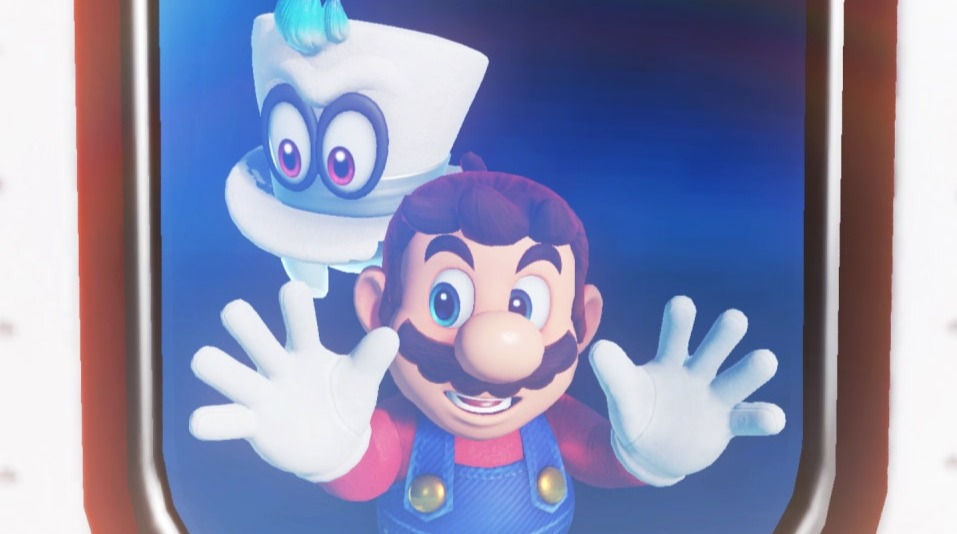
My YouTube algorithm is beyond salvation. I watch videos on everything from Korean street food being prepped to cat memes to Cambodian dudes carving swimming pools into the dirt. Despite this, YouTube still knows that I like Nintendo, so one day it fed me a video called “Mario Speedrunner Tries Champion’s Road for the First Time.” I was in the midst of struggling to beat that very level myself, so I figured I’d see if a pro fared any better.
(He did, but barely).
Once I watched this video, the algorithm knew it had done a good job, so for the next month I was getting spoon-fed videos from a speedrunner by the name of SmallAnt and, I gotta say, Super Mario Odyssey speedruns freaking rule. There are so many different categories, from the obvious 100% or Any%, to absolutely wild stuff like Nipple%, which, for the uninitiated, is the fastest time to get Mario topless. This particular runner specialized in Minimum Captures.
This means that you have to beat the game as fast as you can while capturing as few enemies as possible. If you beat the game in one hour with five captures, and someone else does it in four hours with two captures, they ultimately win because they captured fewer enemies. This category is absolutely captivating (*wink*) and, as I went through this runner’s backlog of YouTube videos, I was consistently enthralled. The tiniest of details discovered in a game could completely upend an entire category. Routes were restructured, strategies rendered inert, and puzzles cracked wide open…it was all fascinating.
I love learning how video games work and how our interpretation of them evolves. It’s why I will slavishly play every game in a series in order or why I’ll spend hours reading about development history on Wikipedia. Games are such a complex, multifaceted art form and speedrunning a game is the ultimate showcase of player understanding. Exploring these runs was like reading a history book on Super Mario Odyssey. I had a greater appreciation for the game, its controls, and its systems…and it ultimately led to me popping in the game and setting sail on another grand adventure.
The "Oh Yeah, I did Play That..." Award
This award goes to the game that I just plain forgot I played.
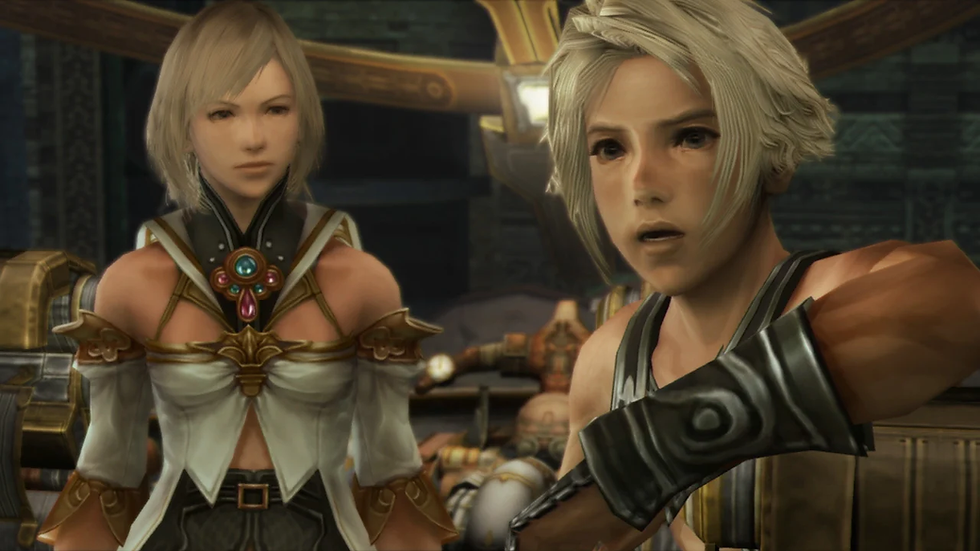
Late December/early January is my “Open World RPG” time of year. It’s a tradition dating back to 2015 where, for a bunch of reasons, I was alone on New Year’s Eve and played Fallout 4 start to finish. Despite its issues, I had an incredible time with the game and decided I’d save future games of that nature for the days immediately following Christmas.
Last year, also, I got very into the Final Fantasy series. I played Final Fantasy VII, IX, and X…the middle game even winning my Game of the Year award. The next entry on my list was Final Fantasy XII and, upon learning that it featured a massive open world and seamless battle system, decided that it would occupy my auspicious winter timeslot.
This game is bizarre. On the one hand, it addressed every complaint I’d ever had with a Final Fantasy title. It boasted a free camera, no grinding, zero random encounters, and an open world that was more Legend of Zelda than Elder Scrolls. The combat, furthermore, was smooth as butter. I didn’t have to agonize over every spell or worry about memorizing how to counter every possible status effect. Once I assigned my characters to the right classes and gave them smart auto-moves, enemy encounters were rarely a struggle.
On the other hand, this game is fucking boring. In the last year or so, I’ve played six Final Fantasy games and I can recount the story of five them, plus their main characters, without hesitation. But I honestly have no idea what this game is about or who any of these characters are or what they want. I had to regularly consult a guide, not to figure out what to do next, but to understand what the hell was going on.
And that trailer? It’s awesome! The first few seconds are dark and serious, but then a switch is flipped and the sell here is “Indiana Jones, but with magical JRPG machinations!” Swashbuckling heroes abound! Exciting setpieces aplenty!
Turns out, the more accurate depiction of the game was in the opening moments of the trailer. The narrative here is nothing but confusing political gamesmanship and brooding protagonists contemplating their destinies.
Final Fantasy XII was so effortless to play that I barely remember doing it. That would be fine…I can play Paper Mario in my sleep at this point. But without memorable characters or an enticing story, this entry into the series had no hook...no reason for me to be enthusiastic about turning on my Nintendo Switch when it was time to play.
The "Glad I Stuck With It" Award
This award goes to the game or series that I'm glad I finished, despite getting off to a rocky start.

The Sunk Cost Fallacy is a fancy business term that describes a very particular mindset. “Well, we already put $100 dollars into this thing, so we might as well see it through to the end otherwise that was all for nothing.” The behavior that follows is always the same: people continuing to sink time and money into a project that they don’t enjoy or won’t be profitable, simply because they think there has to be recoupment at the end of the tunnel. They either don’t believe, or don’t want to believe, that there might not be a payoff.
Alex Russo is the poster child for Sunk Cost Fallacy Gaming. I will not stop until I see those credits roll, regardless as to whether or not I’m having fun. I will play a game knowing full well that I won’t like it, in hopes that I can gain some sort of knowledge or understanding from the process. I do these bizarre deep-dives into franchises looking for answers and I do it with very mixed results.
Last year, I finally played Halo: Combat Evolved and thought it was a boring slog. I was baffled that a game that slow, that repetitive, and that blunt could spawn a major multimedia franchise. It even won my “Just Didn’t Click with Me” award.
Alas, I had purchased the entire Master Chief Collection, so what was I gonna do…not play the rest of the games? I had paid for them, dammit! So, as the months went on, I played through Halo 2, Halo 3, Halo 3: ODST, and finally Halo: Reach.
And I’m glad I did.
I need to be in a very specific mood to play a Halo game; I usually play one after completing an otherwise heady, exhaustive, or mechanically intensive experience. Typically, a Halo game directly follows a Metal Gear or Final Fantasy because I just need the visceral relief that comes from shooting a bunch of shit.
As each game progressed, however, I found myself enjoying Halo’s brand of FPS more and more. This is partly because I know what to expect, but also because the games simply got better. My most recent completion, Halo: Reach, was a prequel to the first game and stands as an incredible monument to just how far the series as come. Funny how the story had to go back in time to illustrate that, huh?
The "Just Didn’t Click with Me" Award
This award goes to the game that everyone loves. Everyone except me.

Late 2019 was a headache for game critics. Two games were released with almost the exact same name: The Outer Worlds and Outer Wilds. To make matters worse, both games were good! Every award show and “Best Of…” list had to make sure they were clear about which title was winning what award. I had seen each game win at least one top prize, and so I decided to play The Outer Worlds as my late-December open world RPG.
It became clear in the following months, however, that Outer Wilds was the game that stuck with people. It made waves when it first released and its ripples long outlasted those made by its similarly-titled counterpart. As it turns out, this was the game I should have played.
It’s here, however, that I need to pump the brakes. It’s true, the game didn’t click with me. But that’s not to say I didn’t like it. I did like it; in fact, I really liked it! From the deeply unsettling imagery of Space Angler Fish to the haunting isolation of the Nomai Ruins to the spot-on implementation of incredible science fiction concepts like a Quantum Moon, Outer Wilds was full of things tailor-made for my taste. I love it when a narrative “already happened” and I love discovering its pieces through tiny atmospheric flourishes.
The experience was just marred by things that seemed to only really bother me in very specific ways. I would text friends or scroll through message boards to see if I was alone in these complaints and, apparently, I was. I never (and I mean never) got the hang of flying my ship. Even on my final voyage, my craft arrived in barely workable condition. I hated that my autopilot would fly me in a straight line towards my destination, instead of going around the literal Sun that was in the way. I detested needing to find a way to kill myself after falling through a black hole because the paths of Brittle Hollow collapsed beneath my feet with little warning.
I was so genuinely dismayed by how many beautiful and meaningful moments were interrupted by unnecessary mechanical roadblocks. At the end of the day, Outer Wilds injected pure dopamine into the Sci-Fi Philosophy part of my brain, while simultaneously stabbing my kinetic nerves with an overcharged cattle prod. And it was a cattle prod that was tuned to my frequency, and my frequency alone.
The "Waiting for Game-dot" Award
This award goes to the game that I didn't play this year, nor last year, nor the year before that. Maybe next year.
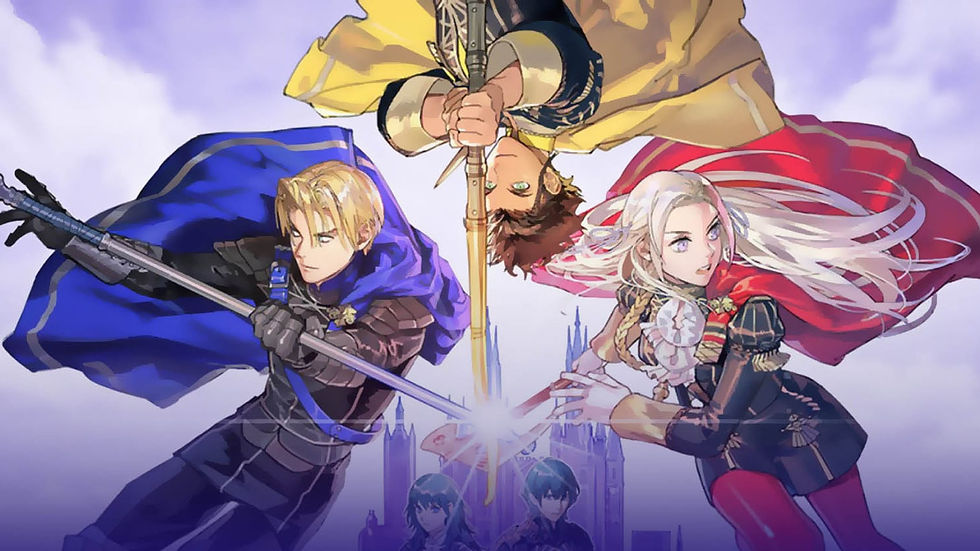
I try to alternate between “time-consuming heavy” game and “light, quick, breezy” game. I usually feel very full, like I’ve had a complete meal, after sinking over fifty hours into a game, so the quick turnover of smaller indie games helps keep things fresh. This year, however, I devoted all of my “big game” attention to titles released by Square Enix and Nintendo. Those are the games that are often ranked as “Bests” of their year, or are recommended to me by friends.
Does this sound familiar? That’s because the same thing happened last year.
My slavish devotion to Fantasies, Marios, and Metroids meant I never got around to playing a game that I’m sure I’d love, Fire Emblem: Three Houses. Nintendo has a way of reinventing genres that I’d otherwise be so-so on. They did it with Splatoon and Mario Kart. But something seems too daunting about learning a game this meaty. This year, I had to just kind of steer clear. Maybe next year, once I finish Operation H.I.D.E.O.
The "Best Backlog" Award
This award goes to the game that I finally got around to playing after years of saying I would.
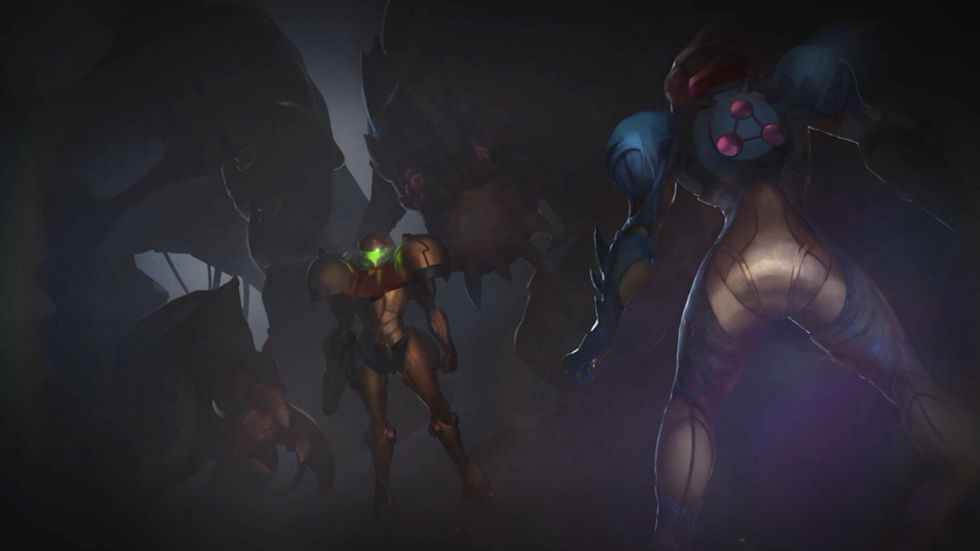
I was very much a Nintendo Kid growing up. I had the N64, then the Gamecube, then the Wii, and so on. That being said, I never had a Gameboy. My mother didn’t buy me one because she thought I’d bring to school and get caught playing Pokémon in class. She was right, for the record. That’s exactly what would have happened.
Years later, when I was in middle school, I discovered Metroid Prime and the rest is history. It became an obsession. I played Prime. Then Prime 2. A year or so later, when the Wii was released, Prime 3. The latest Metroid game was not all the Wii afforded me, however. Thanks to the virtual console, I could finally play the original Metroid as well. After that, Super Metroid. I spent many an hour sitting in my dark basement, poring over maps of Brinstar and Maridia, looking for the coolest items in these older, denser entries.
By this time, I was already in high school and, while I could probably afford to buy a Gameboy of my own, I had already decided that I was “a console gamer.” I just didn’t really care to seek out a handheld machine anymore. And, thus, Metroid Fusion remained wholly untouched.
Fast forward to summer of 2021, and Nintendo drops a bombshell: Metroid Dread is real. The title, first leaked in 2005, became a meme in the Metroid community. As nebulous as Super Mario 128 and as overdue as Half-Life 3, the news on Metroid Dread had been so sparse that most people had given up hope. Yet here it was, on our screens, promising to be released in October 2021.
Finally, that last bit of motivation to play Fusion.
Honestly, I have no idea why I didn’t play it sooner because of course I loved it. Of course it’s exactly my shit. Of course it absolutely rules. Why did I wait so long to play this game? I could have been playing this game over and over and over again for the last twenty years!
But ya know what? I like that it happened this way. I knew the broad strokes of Fusion’s story from hanging out on Metroid forums as a teenager and the Metroid Dread trailer made some promises about how it evolved from Fusion. So being able to look at the Fusion for the first time, while also knowing what to look out for, made it an absolutely incredible experience.
Metroid Fusion’s storytelling is more overt than that of its predecessors. An NPC named Adam gives Samus loose directives and the SA-X encounters are unlike anything else in the series. But what Fusion lacks in isolation, it makes up for up a tension so palpable you can cut it with a knife. Terrifying bosses loom in the background while Samus fights her way through structures full of mutated horrors.
More impressive than anything else, however, is Fusion’s reverence for the series. Every bit of throwaway lore or flavortext found in ancient game manuals is repurposed here to great effect. This game is a love letter to Metroid, but it’s never held hostage by that veneration. Samus’s journey is a continuation of the past we’re all so familiar with, but is still a step forward in every meaningful way.
Fusion isn’t just required homework for those itching to pick up Dread, it’s necessary playing for anyone who is a fan of the expert marriage of story and gameplay. It is an absolute triumph of action and adventure, and I promise I won’t wait 20 years to play the next one.
The "Game That Made Me Think" Award
This award goes to the game that has educated or informed me in some way.
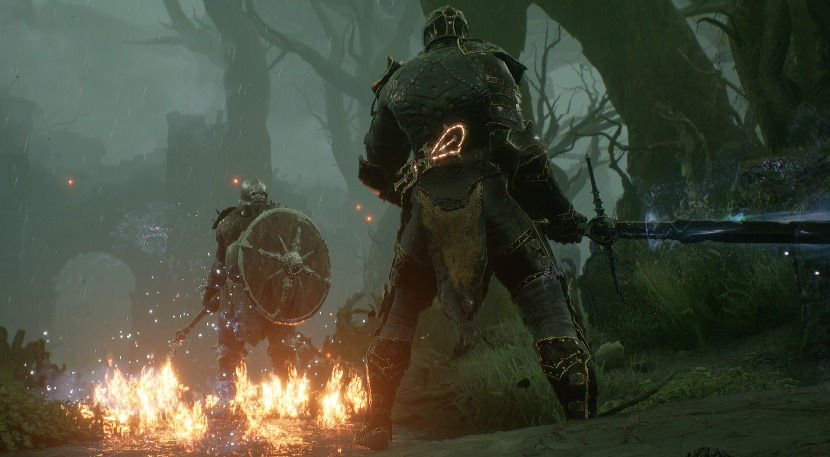
I have a love-hate relationship with the Dark Souls trilogy. On the one hand, they are great games that I love for a multitude of reasons. On the other hand, I hate what the internet has done to them. It’s a hard game? Oh, so it’s just like Dark Souls. It’s an action-RPG? Yep, that’s Dark Souls right there. Horror-fantasy world with interconnected paths? You’ve got yourself a Dark Souls.
So when Mortal Shell first came across my radar, I immediately dismissed it. Yeah, it’s like Dark Souls, alright, so is everything. A few weeks later, I had heard some critics on a podcast for The Escapist talking about the game. Apparently this game actually was kind of like Dark Souls. So, on a whim, I placed the order and a few days later sat down to give this game a shot.
And folks, lemme tell ya, it’s Dark Souls alright!
Dark Souls, but worse. The opening levels lack distinctive landmarks, so getting lost is easy; the controls aren’t as smooth, so controlling your character feels rather clunky; the game, overall, just lacks polish. I invested a little over an hour or so without making much progress at all…I need quite a bit of time to learn how to even play the damn game.
Eventually, I hobbled my way through the first of Mortal Shell’s three dungeons and, by the end of the experience, had promoted the game from “bad” to “fine.” It’s a finicky little thing, but it was starting to work for me. As I maneuvered my way through the second dungeon, I had grown even more familiar with the game’s many systems and decided that, for a Dark Souls clone, it’s not too bad. Then, I arrived at the third dungeon and things changed.
When reading about Dark Souls (or Bloodborne or Sekiro), a lot of writers will describe combat as “a dance.” The act of managing stamina, knowing when to roll, deciding when to tank, and laying down an attack is somewhat akin to the fancy rhythmic footwork that goes into dancing. Each of FromSoft’s titles have their own way of approaching combat and, though there are many similarities, each game’s “dance” is decidedly different from the last.
Mortal Shell, likewise, has a wholly unique dance of its own. Yes, you have a stamina bar and health bar, like in Dark Souls, but you don’t have a shield. So is it Bloodborne? No, because if your HP reaches zero, you fall out of your Shell and need to retrieve it. Once retrieved, you’re alive again, but you can only really do this once in battle. How very Sekiro, right?
This Frankensteined system may sound like it’s just picking and choosing the best aspects of each game, but in reality, the resultant “dance” that Mortal Shell offers is profoundly elegant. As I explored the third dungeon, I had found that I was now a master of this inimitable brand of combat. I was dodging, attacking, taking a calculated rest, and using the game’s other unique ability: hardening (turning into stone so that you will take zero damage from the very next enemy attack, no matter what).
The tone of the game had also shifted, as we left the Souls-esque dark fantasy caverns for a prog-metal Mad Max-y fortress of steel and obsidian, fighting warriors of a cult instead of zombies and spiders. I fought one of the most visually striking bosses in recent memory, and did it without a single death. Once victorious, I slowly returned to the hub, remarking on my way back about how this dungeon was nearly twice as long as the prior two dungeons combined. I was also struck by how the game managed to build a new level simply by forcing the player to navigate the dungeon in reverse.
We call games “clones” or “-likes” because, when a genre is being born, we don’t quite a have a word for it yet. Half-Life was a Doom clone because we didn’t have the term “First Person Shooter” yet, Mario + Rabbids: Kingdom Battle was an XCOM clone because “turn-based tactical strategy game” doesn’t exactly roll of the tongue. Likewise, we haven’t quite nailed down what makes Dark Souls, well, Dark Souls, so calling Mortal Shell a Souls-like game makes sense in the short term.
But doing that is a disservice to games like Mortal Shell. For all its lack of polish, the game has fully digested Dark Souls and has done an incredible job at making something new. It takes a lot of inspiration, but it’s never uninspired. When it comes to Mortal Shell, we’re witnessing the birth of a new genre, and that’s pretty damn exciting.
The "Best Encounter" Award
This award goes to the best thing you came across in a game, be it a boss battle or buried treasure.
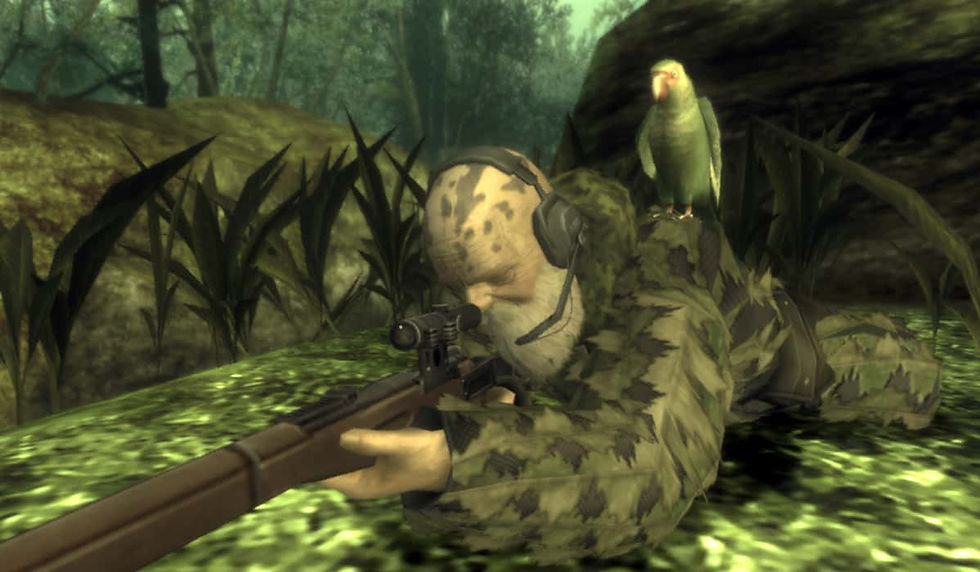
As a part of my ongoing effort to play every Hideo Kojima project, the Metal Gear Solid games have been unpredictable, to say the very least. What one game does well, another does poorly. For every innovation here, there’s a step backwards there. While I’ve certainly enjoyed my overall experience with each game, the consistent disappointments in each game are the boss battles. They just seem so at odds with the rest of gameplay.
Everyone told me that Metal Gear Solid 3: Snake Eater fixes that. To a certain extent, they’re right. I’m no longer getting on the floor to re-plug my controller back into the PlayStation or fighting with janky camera angles just to get a good look at the boss. However, in a world so slavishly dedicated to realistic firearms and tactical espionage action, throwing fifteen grenades at a man covered in bees still doesn’t quite do it for me. All of that changed when I got to The End. I don’t mean “the conclusion of the game,” mind you. I mean the person that is named “The End.”
Who’s on first?
You see, The End is a sniper. Unlike every other boss in the game, this pensive old man is content to hide amongst the trees and wait for his opening. It’s just me and him, alone, in a massive jungle, whittling away the hours until one of us makes a false move.
I too had a sniper rifle, so I too lay beneath some foliage, carefully scanning the horizon, hoping against hope that I’d see his scope glimmer briefly in the sunlight. It was a slow process, and there was no up-tempo music urging me to get a move on. We were two men, sitting patiently, waiting for glint from a small piece of glass to betray the other’s location. It was slow, but it was riveting.
Confession: this was not my favorite encounter in all of 2021. Another game provided a different battle and, though it was everything I wanted, it was also exactly what I expected. The End, however, was one of most surprising and ingenious fights I’ve ever played. It’s so brilliant, so obviously perfect for a video game, yet I’ve never played anything like it. So while it may not have actually been my favorite, it certainly was the best.
The "Unexpected Joy" Award
This award goes to the game that defied expectations and was more fun than anticipated.
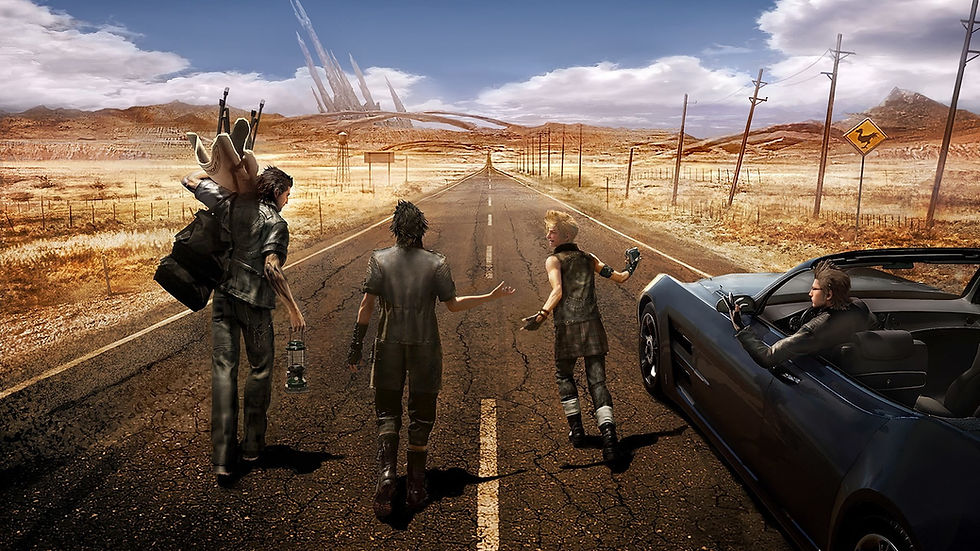
In addition to playing every Kojima game, I was also on a bit of a Final Fantasy quest. Last year, when Final Fantasy VII Remake came out, my friend made the mistake of telling me that the game isn’t just a remake of the original game, but a sequel to every Final Fantasy game that came before it. I knew I couldn’t jump straight into Remake, that’s not how I’m wired, but I also now couldn’t play just VII. I had a lot of homework to do.
There are…a lot of Final Fantasy games and so I decided that I need to make a truncated list of which titles would give me a broad strokes look at the franchise’s evolution without completely burning me out. We decided I should start with VII, skip VIII, play IX, then X, pass on XI, breeze through XII, save XIII for later, knock out XV, and end on VII Remake.
It’s funny, the titles I was looking forward to the most, X and XII, ended up being the duds of the list. Meanwhile, IX was absolutely outstanding, and VII was the perfect place to start this journey. The game on this list for which I was least excited was that which remained: Final Fantasy XV.
For one, it had a crappy movie starring Aaron Paul and Sean Bean, plus a tie-in anime to explain the main characters’ childhoods, all as pre-requisites for a game that looks wholly unappealing. All the ads showed a bunch of dudes in a car with black leather and tattoos and sunglasses. These characters looked like what I imagine the music industry thinks is Cool, and they were always just hanging out by campfires or standing by the side of the road. It looked…pretty lame.
You’ve read the name of this award. You know how it shakes out.
Final Fantasy XV’s characters are some of the strongest in the entire series. From their backstories to their personalities to their interactions with others, all of it feels very right. On top of that, the game’s roadtrip presentation is one of the most inventive framing devices I’ve ever seen. Whether we are springing for a hotel or crashing on a dingy mattress in an RV, the notion that we are friends that get roped in a big adventure whilst otherwise on the road is perfect for an adventure game.
And these aspects of the game aren’t cosmetic, either! The way XP is only tabulated at the end of the day and is affected by how comfortable of a night’s sleep you get? Brilliant! Giving each character a skill that both forges their relationship AND acts as a functional part of a real world road trip? So cozy!
Partway through our travels, Final Fantasy XV becomes a more standard Final Fantasy game. The open world is put on the back-burner for a more traditional series of maps and, of course, we have the obligatory boss rush to close out the campaign.
But Final Fantasy XV never abandons its excellent tone or character work, not for a second. When I looked at how many hours I had spent with the game (and all four DLCs packs), I was stunned. Twenty-eight hours? Are you sure? Well, like any trip spent with good friends, it’s over before you know it.
The "Hindsight is 2021" Award
This award goes to the game that, in time, I've changed opinions on, for better or worse.
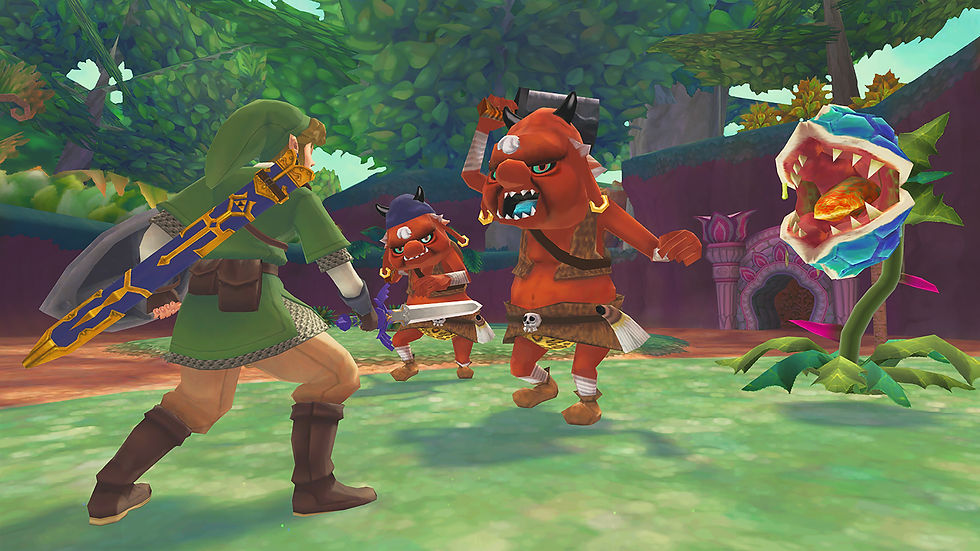
In December of 2012, it was finals week for Alex Russo…and he was looking to procrastinate. Instead of studying, he turned to his shelf and remembered that had been gifted The Legend of Zelda: Skyward Sword nearly a year earlier, but hadn’t gotten around to playing it. Video games or schoolwork? The choice was obvious!
I didn’t really care for Skyward Sword when I binged it that week, but it was something other than my tedious junior year coursework, so I played it all the same. I had finished most of the game by the time my tests rolled around; all that remained were the last three fetch quests and the final dungeon. However, I had just finished my last exam and no longer needed to procrastinate, so the game would go unfinished.
Time skip. February 2021 rolls around, and with it comes a new Nintendo Direct. It’s the 35th Anniversary of The Legend of Zelda and I, like most fans, was hoping for a mega-collection of Zelda games akin to the Super Mario 3D All Stars collection. We didn’t get that, unfortunately. Instead, we got a port of what I considered to be the worst Zelda game.
As Skyward Sword’s re-release approached, Nintendo had tweeted some encouraging statements. All of the little annoyances, like mandatory hints and endless item explanations, had been cut back. This version of the game would be much smoother, less intrusive, and all-around more “player friendly.” Good to know! My hope was that I could play this game with an open heart and open mind, and, in so doing, discover the excellent game that I missed out on nearly a decade prior.
The improvements to The Legend of Zelda: Skyward Sword HD are noticeable. They make it incredibly easy to cut through the noise and see what the game is really all about. The problem, however, is that the core game is caught in a frustrating no man’s land of design.
Skyward Sword is the exact midpoint between Twilight Princess and Breath of the Wild, but it doesn’t do anything as well as either of them. When comparing Skyward Sword to Twilight Princess, we see that its dungeons are far less thought provoking, its world is far less engaging, and tone is far blander. Conversely, the scavenging, crafting, and exploration aren’t nearly as fleshed out as they are in Breath of the Wild. Compared to both its predecessor and successor, Skyward Sword feels like Diet Zelda.
This conclusion, of course, can only be drawn with the benefit of hindsight. The stamina wheel, sailcloth, breakable items…they all originated in Skyward Sword. So is it fair to criticize this game, just because the next game did it better?
Yes and no.
True, Breath of the Wild would integrate these mechanics in far more satisfying and thematically appropriate ways, but Skyward Sword fails to make them fun in their own right. Even without the knowledge of what would come later, the sail cloth still feels pointless, the crafting is still monotonous, and the exploration still comes across like filler.
I had very few memories of Skyward Sword from that week I crammed it, instead of math, into my head. Flying around on a bird? Some time travel stuff in a desert? A big monster with gross looking toes? I wanted to understand how many of my memories were accurate. Maybe there was a good game in there after all. Unfortunately, despite its best efforts, Skyward Sword still sinks to the bottom of my favorites list all these years later.
The "Best Replay" Award
This award goes to the game that I replayed and for which I’ve gained a new understanding or appreciation.

Fire Emblem: Three Houses isn’t the only game that’s getting a repeat win. Last year, when Super Mario 3D All Stars was released, I beat each of the three games within a week of release. My previous thesis statement was: Super Mario 64 is an A+ in a style I like, Super Mario Sunshine is a B+ is a style I like, and Super Mario Galaxy is an A+ is a style I don’t like. Two out of three statements held up, but Galaxy got a bit of a promotion. True, it was far more linear than 64 and Sunshine, but maybe I didn’t dislike linearity as much as I thought I did.
This year, because of reasons, I replayed Super Mario Galaxy two more times, once as Mario and once as Luigi. As I was really digging into the level design and controls, I was struck by just how incredibly intuitive everything is. From curated objectives to experimental challenges, every single pixel making up Galaxy is right on the money.
There are a handful of Power Stars in 64 that irritate me. Sunshine is chock full of Shine Sprites that are either unfinished or not thought through. But I’ll be damned, I can’t think of a single Power Star in Galaxy that is “bad.” There are two or three that aren’t my cup of tea, but none of the associated objectives are broken in ways that, say, a magical floating Pachinko machine may be broken.
Super Mario 64 will (probably) always be my favorite Super Mario game because of how personally meaningful it is to me, but Super Mario Galaxy might damn well be the best game in the entire series. Even typing that out now feels crazy to me. Two years ago, I would have questioned how ANYONE could think of Galaxy as the best Super Mario game. One year ago, I would have entertained the idea, but still disagreed. This year? Hell, I think those people might be right.
The "Best Music" Award
This award goes to the game with the best music. Kind of self-explanatory.
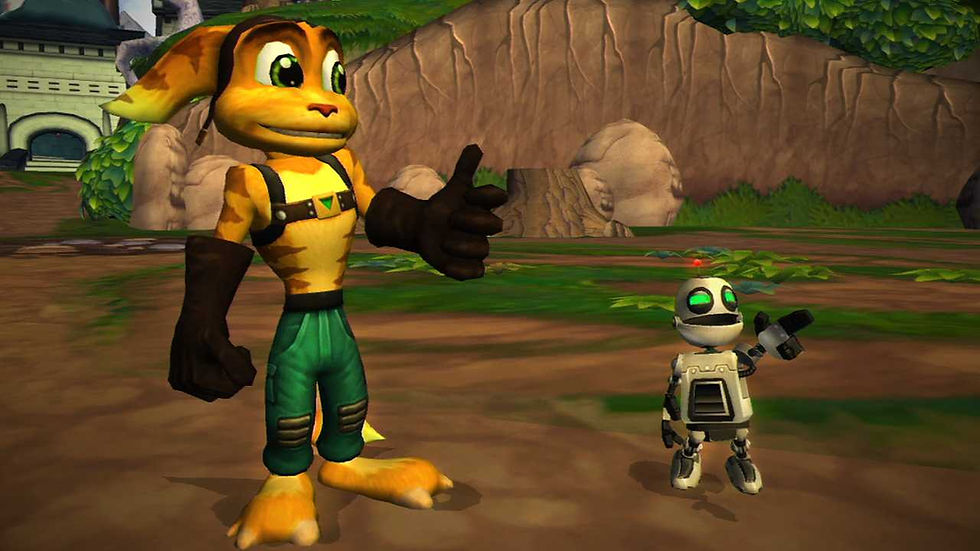
Yeah, I played a lot of 3D platfomers this year, but they weren’t ALL Mario games! In my ongoing mission to catch up on the biggest PlayStation games I’ve never played, I knew one day I’d have to dig into Ratchet and Clank.
I had a vague understanding of what these games were all about; they are half-platformers, half shooters starring a weird cat-weasel alien and a tiny little robot. What’s not to like? Despite a few mechanical hiccups here or there, my playthrough of the first game was thoroughly enjoyable. It was pretty in line with my expectations, no big surprises to be found…except for one.
I had no idea that the music would be this funky.
Every planet I visited had a very distinct identity, from eerie caves to sprawling construction yards. Each song on the soundtrack reflected the feel of their associated locales, but there was a common thread connecting each tune: they all slap.
Ratchet isn’t a big city guy…he lives in an old spaceship hanger on a desert planet. When we first step foot on planet Kerwan, the New York City of this universe, hundreds of awe-inducing skyscrapers and flying cars fill Ratchet with a sense of urban wonder. Add in a tablespoon of sickass funk, and you’ve got yourself the perfect metropolitan melody.
Pokitaru, on the other hand, is a luxurious island resort under siege from the evil Chairman Drek. As we sneak through the sewers in search some additional power-ups, the soundtrack mixes the steel drums of the tropics with the jazzy motorized percussion to which we’ve become accustomed on this journey. The occasional leitmotif even resurfaces to remind us what we’re looking for and who we’re after.
There are very few soundtracks that are “listenable” from start to finish. Every game has its dud track or that atonal boss theme that takes you out of the groove, but it’s so easy to get lost in Ratchet and Clank’s soundtrack. It does what every good score should do: keep you invested without ever commanding your attention. Whether you are playing the game, or listening to a mix on YouTube, these songs comprise a non-stop playlist of perfection.
In fact, listened to the whole soundtrack while writing this!
The "Best Multiplayer Game" Award
This award goes to the best game for multiple players.
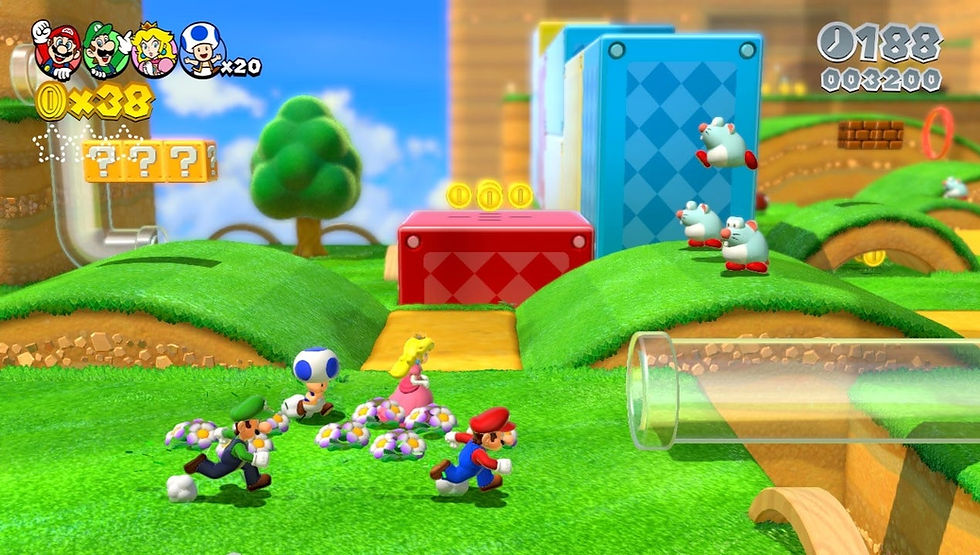
By this point, you’ve surely gleaned that I have a strong love for the Super Mario franchise. It may surprise you to learn, then, that I really really really dislike Super Mario 3D World.
If I’m being honest, it’s the antithesis of everything I enjoy about Mario games. It’s very linear, allows for very little player experimentation, and puts movement on the backburner in favor of gimmicky abilities gained through power-ups. When I play a Mario game, I want to explore a world, try some wild stunts, and find the many secrets hidden away in the map; 3D World offers none of that. I tried playing this game when it first came out in 2013, and I found its brand of platforming so distasteful I stopped playing Nintendo games for years.
(Well, the Wii U may have had something to do with that too).
I bought the re-release for the Switch this year and, though I saw it all the way through to Champion’s Road, I still didn’t gain much affection for it. I had known since March that Outer Wilds was going to win the “Just Didn’t Click with Me” award, so what was to become of this game? Nothing, really. It was going to disappear into the recesses of my brain, forgotten and unloved.
Then, for reasons, I decided to play through some key levels with a group of friends and at that point, Super Mario 3D World became an entirely new game. Suddenly we were shouting, jeering, laughing…at the screen and at each other. We tried to stay in sync, but couldn’t. We elected a leader, then usurped him. We wrestled for control of the camera, watched our plans crumble before our eyes, and fell to our deaths more times than we could count.
I’ve finished Champion’s Road on my own. My friends and I couldn’t beat it together. But that loathsome level was far more fun as a group endeavor than a solo one. Perhaps the same can be said for the game as a whole? Maybe, just maybe, I had been playing Super Mario 3D World all wrong from the start.
The "Wildcard" Award
This award goes to a game that deserves a shout out, even though it may not be the best at anything.

I’ve got two quick facts to share. Fact the First: no single piece of art has had a greater effect on me than Metroid Prime. It is my favorite game of all time and always will be. It taught me more about storytelling and world building and genre than I probably even realize. It opened doors for me that I didn’t know were there. As I worked my way through the Metroid franchise as a teenager, I found new things to love in every game I played, and I owe it all to Metroid Prime.
Fact the Second: When I do these year-end lists, I refuse to give the same game two awards. It forces me to think more critically about the titles I’ve played, instead of copping out and saying “Game X was my favorite, so it wins everything.” Once a game shows up on this list, it won’t show up again.
But that means if Metroid Dread is here, then, (gasp!), it isn’t Game of the Year! How can that be? Liking Metroid is my whole brand! And I just wrote that glowing little blurb about Metroid Fusion and how it’s great and how there is so much anticipation for Dread and how….
Uh-oh. Is Dread…bad?
Don’t worry. Dread is not bad. Dread is very good, great even. I absolutely loved Metroid Dread and everything it did (aside from one cowardly plot point at the very end of the game). All in all, this long-awaited entry was everything I hoped it would be.
But that’s really all. It was a game that met my expectations. A few small surprises here, some neat gimmicks there, but in general, it was exactly what I wanted.
Playing Metroid Dread is like returning to your hometown and thinking “Yeah, this restaurant is as good as I remembered! And my name is still carved on tree by the playground! And, oh yeah, look at that silly logo the bagel shop still uses, I forgot about that!”
Metroid Dread is a terrific homecoming for a series that had been seemingly abandoned by Nintendo. It doesn’t take any massive risks, but it doesn’t need to. The goal of Dread is to remind everyone what they loved about Metroid in the first place. In that regard, MercurySteam made an excellent game. It deserves praise for being an absolute joy from start to finish.
But if a brand-new Metroid game couldn’t top Alex’s list…what could?
The Game of the Year
The big boy.
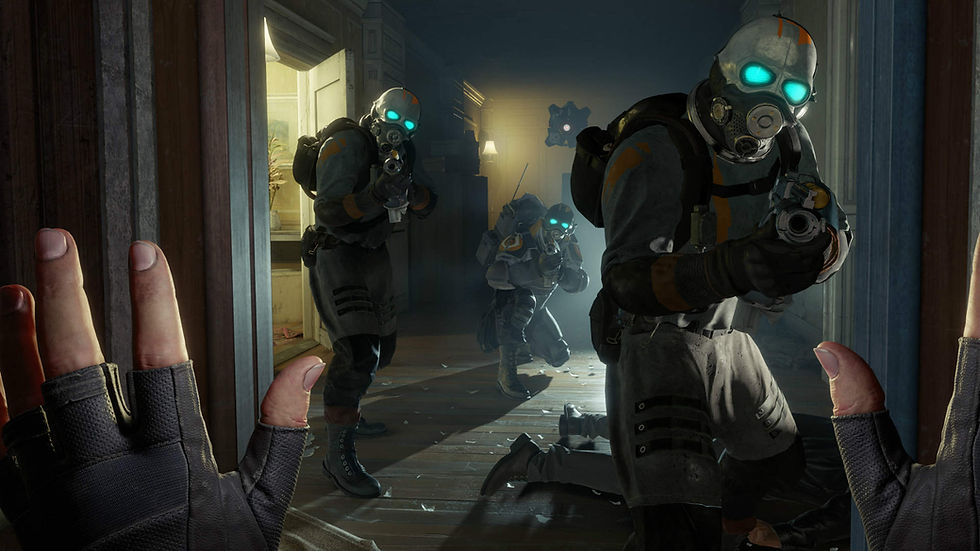
Half-Life 3 is a meme, more than anything else. It’s a game that doesn’t exist, hasn’t ever existed, and will not exist for years to come. When that fateful day arrives, I don’t know if the game can be more good that the meme is noteworthy. Half-Life 3 will always be famous for not existing.
If you haven’t played Half-Life 2, though, you might not understand why the world is so ravenously hungry for a new entry. There are a lot of good games that didn’t get sequels, so what makes this one any different? Well, for one, Half-Life 2 isn’t good, it’s great; easily one of the best games ever made. More important, however, is how Half-Life 2 ends.
The Half-Life series isn’t a happy one. It shows, better than any movie or book or graphic novel, just how doomed humanity would be if a superior alien force decided to invade. The game references “The Seven Hour War” and, frankly, I think that’s even generous. Gordon Freeman, Alyx and Eli Vance, Barney Calhoun, and Dr. Kleiner all face tragedy after tragedy in their fruitless effort to save humanity.
Half-Life 2 ends on a positive note, the first one in the series. Because our hard work, humanity strikes a blow so decisive against the Combine that the tides might finally be turning in this war. Unfortunately, the celebration lasts mere minutes, as the player witnesses one of the most gut-wrenching cliffhangers in all of storytelling. It’s a plot twist so devastating, I was sick to my stomach for hours after finishing the game.
And that was it, for years.
That final scene, and the voices that accompany it, have been seared into my brain ever since. I can’t think about Half-Life without thinking about that scene and how wonderfully, cruelly perfect it is. It is painful, without being unfair. It is surprising, but exactly what we should have expected. It’s wrong, but it’s also exactly right. For over a decade, this was the farewell given to me by Half-Life.
It would take twelve years, but on November 21st, 2019, Valve released a trailer for a new Half-Life game. My heart would leap…and then immediately drop.
This new Half-Life was a VR game. I couldn’t play it. First of all, a VR headset would cost me hundreds of dollars. But on top of that, there’s no way my computer could support a headset even if I had one. I’d need to upgrade my entire rig.
But even then, was this game going to be a, uh, real game? It sounds shitty, I know, to say that one game could be a “real” game while another could not. It’s gatekeeper-y to imply that something lacks validity just because it isn’t what I want. But, at the same time, Half-Life 2 was an incredibly balanced, nuanced shooter and, well, most VR games I’d played lacked a certain amount of depth. They were mostly simulators where you could look around and pick up items. I had never seen one with a campaign as meaty as any found in a Half-Life game.
The final nail in the coffin, however, was that this wasn’t Half-Life 3. This was a prequel, set between the events of Half-Life and Half-Life 2. So even if I could afford to play this game, and even if it was rock solid, the story would be ultimately toothless. After all, the events of this story couldn’t be important, because Half-Life 2 still had to happen.
Well, I guess I just…wasn’t going to play it. Oh well. Time to move on.
And that’s what I did, for over a year, until the stars aligned. I had just enough money put aside where I could upgrade my PC without feeling guilty, my fiancé instructed my family to pool their birthday gifts and buy me a Quest 2, and my friend Steve send me a code on Steam for the game. The time had come for me to play Half-Life: Alyx.
The Half-Life series has always been comfortable providing the player with very little. In the original game, the first several minutes are spent on a cable car doing nothing. We look out the windows and take in our surroundings as the train descends deeper and deeper into Black Mesa Research Facility. Likewise, the second game’s introduction asks very little of us. We walk through the check-in facility at City 17 and, when finished there, explore the dilapidated plaza in the heart of the town.
Half-Life: Alyx is no exception. Our first hour is spent exploring the city as we learn how to navigate in Virtual Reality. The very first thing that struck me is just how big everything is. Combine soldiers, once a few inches tall on a computer monitor, were now full-sized men. Cars drove by me and, well, they looked like actual cars. The sense of scale, and accompanying claustrophobia, were exactly what this world needed to establish and it effortlessly did so.
It takes several hours for Alyx to introduce everything. First we learn how to walk, then how to pick things up, then how to pick things up from a distance, then how to put things in our backpack, how to take things out of our backpack, how to fire a gun, how to load a gun, how to switch guns, etc. The enemies we fight in these opening chapters are slow and sparse; so slow that I was starting to worry that the game would be kind of a slog.
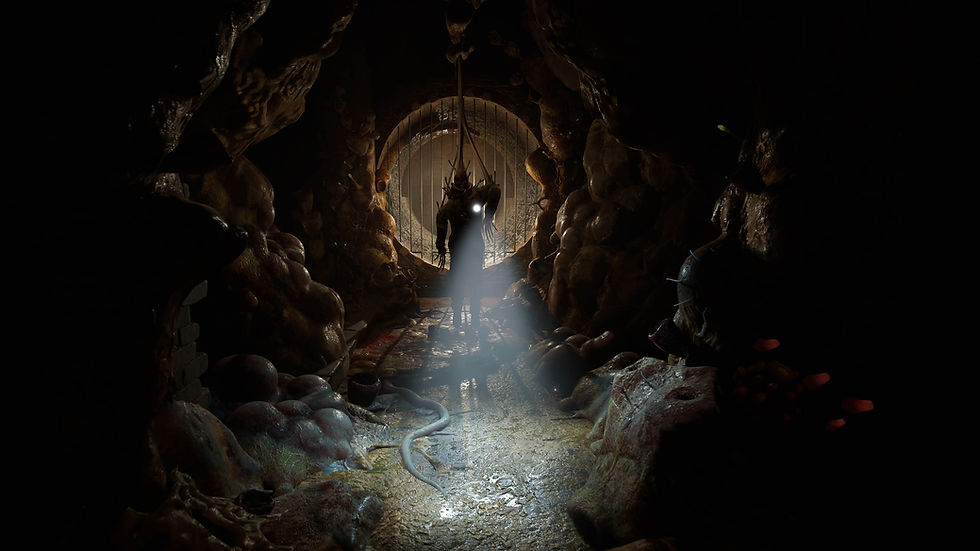
Then, the game says: “Alright, I think you’ve got it. Here’s some real shit!” And then, well, it gives you some real shit. The firefight that followed was, in a word, awesome. I was on a derailed subway car, laying on the floor, standing up to squeeze out one, maybe two, shots against Combine soldiers before needing to duck again. They lobbed grenades at me; I caught them and threw them back. I was scrambling, looking for options, becoming more stressed about how I was trapped in a tight space and the enemy had me surrounded.
This was the promise of VR, realized.
I had long been a skeptic, you see. I always felt that VR couldn’t work because your brain was too smart to be fooled. Unless the game had 1:1 movements, like a driving simulator or mech-fighting game, there was no way a game could convince me I was touching a tangible item when I knew that I wasn’t.
About halfway through the game, I was low on ammo. I had just cleared out an office and I needed some bullets. I saw a filing cabinet on the other side of the room, so I walked over, bent down, and pulled open the bottom drawer. Nothing. I stood up a bit, opened the second, still nothing. I stood up all the way, opened the top drawer, and found some shotgun shells. Perfect. I stuffed them in my backpack, then pushed the top drawer closed, pushed the middle drawer closed as well, then kicked at the bottom drawer to shut it.
But the drawer didn’t close. Why didn’t it close?
Oh yeah, because my feet don’t have sensors on them. The game has no idea what any part of my body is doing, save for my head and two hands. But I forgot that. I was so incredibly, unquestionable immersed in the game that I forgot how I was playing it. There were no controllers or headsets or computers…in that moment, I was actually in the warehouse.
This was the entire game. Every single chapter, so full of interactive detail that I was constantly forgetting what was real and what was game. I didn’t know it was possible. I didn’t realize just how weak my stupid monkey brain was in the face of this incredible technology. I was speechless.
Before I wrap this up, I have a quick aside. Remember early, when I said my fight with The End wasn’t actually my favorite encounter of the year? My real favorite moment came in the penultimate chapter of Half-Life: Alyx. I won’t spoil it, but if you’ve ever read my “Top Ten Video Game Moments” list, then you can probably guess what moment in Alyx had me squealing with glee and shrieking in terror.
Anyway, back on topic…
I could finally afford to play Half-Life: Alyx, so that was Gripe #1 scratched off my list. Alyx’s campaign was also far deeper than I would have ever expected from a VR game. That takes care of Gripe #2. But what about that third gripe? No matter what happened, this was still a prequel and, therefore, nothing in the story really “mattered.”
Yeah, that was a problem. The whole game, characters were talking about the events of the first Half-Life and my knowledge of Half-Life 2 was there to fill in the purposeful gaps. It became clear, about two-thirds of the way through the game, that the entire driving force of the campaign was to set the events of Half-Life 2 into motion. Okay, I get it. It’s cute. Alyx Vance is the unsung hero because she causes Half-Life 2 to happen.
Then I figured out what was going on. And I figured it out right when they wanted me to.
In a matter of minutes, I was screaming, laughing, crying, and then screaming again. Everything I thought I knew about this game, about Half-Life as a whole, all of it was called into question. I had the rug pulled out from underneath me in a way I can’t even begin to describe. Once again, Valve had done it. They delivered another grand slam cliffhanger.
In any other year, Metroid Dread would have won Game of the Year. It was a game that did, basically, everything I wanted. But Half-Life: Alyx did more. It did things I didn’t even know were possible. It proved me wrong at every turn, added a rich new chapter to the franchise, and pushed gaming forward in profound and immeasurable ways. I think about Half-Life 3 and what I hoped it was and what it now could be. The future is limitless.
Half-Life: Alyx isn’t just the game of the year. Hell, it isn’t even the game of the decade. It is quite simply one of the greatest games I’ve ever had the privilege of playing.


Comments